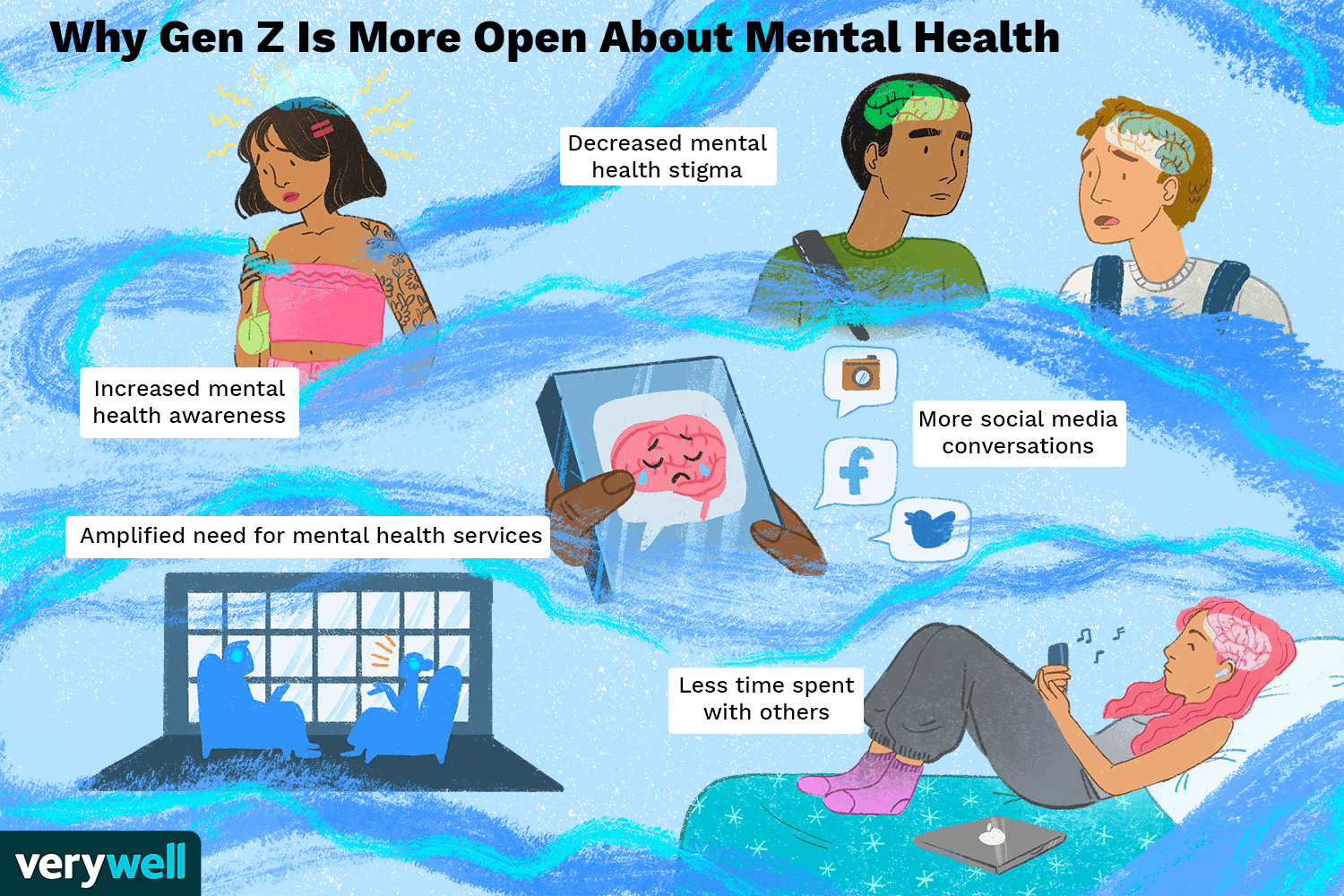INTRODUCTION:
Do you really know what Gen Z stand for and the information behind it?, Generation Z, often called ‘Zoomers’, is significantly altering the current conversation by bringing a unique perspective shaped by their digital native upbringing, prioritizing authenticity, social justice issues, and open dialogue on mental health, leading to inclusive, direct and sometimes informal communication style across various spheres, from the workplace to social media interactions. The Gen Z generation is the contemporary generation or the modern generation, individuals born between 1997 and 2012. Members of generation Z are growing up in an age of increased of stress and anxiety. It is obvious that they are 80% of generation Z dealing with anxiety or depression compared to older generations, according to recent Gen Z studies. Read carefully for your to known the Influence of generation Z on the mental health.

GEN Z’S MENTAL HEALTH CATASTROPHY:
The gen z generation is the first to be raised online; they encounter unique challenges that affect their psychological state. Since the internet has offered nearly unlimited access to information and social connections, it has also exposed young people to cyber bullying, social-induced pressure, and a constant barrage of information. To make matter worst, young adults grapple with uncertainty about their future, financial insecurities, and feelings stigmatization, isolation and loneliness due to changes in dating and relationship patterns. Gen z is the most depressed and anxious when compared with other generations. Statistically, 42% of Gen Z battles with depression and feelings of loneliness and hopelessness, which is almost twice as high as Americans who are over 25(23%). The anxiety in Gen Z has reached an alarming level with 61% having been medically diagnosed with an anxiety condition. The research also revealed that the most common anxieties for Gen Z include the future, finances, work, social activities, and relationships. Mental health can be one of the most taboo problems with Gen Z in the workplace, as Gen Z struggles with mental health conditions at higher rates than other generations. According to Mckinsey, over half (55%) of Gen Zers report having either been diagnosed or receiving treatment for a mental health condition, compared to 31% of people aged 55 to 64, who have had decades longer to seek and get treatment. Indeed the Gen Z mental health has become the focal point of concern and conversation.

EFFECT OF MENTAL HEALTH ON GEN Z:
Mental health can affect mood, thinking and the ability to interact with others. The following are the effects of mental health on Gen Z;
Clinical depression: the persistent feelings of sadness or loss of interest that characterizes major depression can lead to a range of behavioral and physical symptoms. These includes changes in sleep, appetite, energy level, concentration, daily behavior or self –esteem. Depression can also be associate with thought of suicide.
Anxiety disorder: symptoms include stress that’s out of proportion to the impact of the event, inability to set aside a worry and restlessness. They may experience lack of concentration, racing thought or unwanted thoughts, hyper vigilance or irritability, fear and trembling. Etc .
Dementia : symptoms like forgetfulness, limited social skills and thinking abilities so impaired that it interferes with daily functioning. They also experience, mental decline, lack of restraint, loneliness, hallucination and memory impairment. Etc ,
GEN Z AND MENTAL HEALTH SENSITIZATION
In as much as Gen Z faces all these challenges, they stand out willingly to discuss and seek help for their mental health issues. This generation is reshaping perceptions about therapy. Compare to the previous generations, they are more likely to acknowledge their mental health struggles and actively seek professional assistance. According to Harmony Healthcare IT’s report, two out of five Gen Zers surveyed go to regular therapy, and 53% have at some point received professional mental health services. Due to their openness, mental health service demand increased, especially those specializing in youth and family therapy. The field of therapy has seen a modernization to meet this demand in recent years, especially with the rise of online mental health service such as BetterHelp and the popularity of wellness apps such as Headspace and calm. These platforms have revolutionized access to mental health support, making therapy more accessible, convenient, and often more affordable. This shift in attitude towards mental health has underscored the needs for more qualified mental health professionals.

SOLUTION ON THE EFFECT OF MENTAL HEALTH ON GEN Z
To help Gen Z with their mental health, focus on creating open conversations about mental health , encouraging healthy social media habits, promoting self-care practices like exercise and mindfulness, providing accessible professional support , and addressing the unique stressors they face from academic pressures, social comparisons, and economic uncertainty, all while fostering a supportive and non-judgmental environment. Etc
CONCLUSION:
Finally , Generation Z faces significant mental health challenges, including heightened rate of anxiety and depression, largely attributed to factors like constant digital exposure, academic pressures, societal concerns, and the impact of social media comparison; however, this generation also demonstrates a positive trend towards open discussion about mental health, actively seeking professional help, and developing coping strategies to navigate these complexities, highlighting the needs for improved access to mental health services and supportive environments to foster their well-being.


Leave a Reply